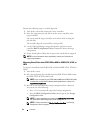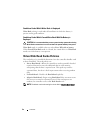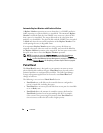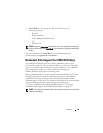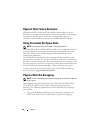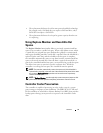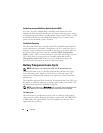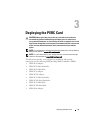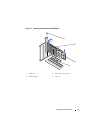
30 Features
Physical Disk Failure Detection
Failed physical disks are detected and rebuilds automatically start to new
disks that are inserted into the same slot. Automatic rebuilds can also happen
transparently with hot spares. If you have configured hot spares, the
controllers automatically try to use them to rebuild failed physical disks.
Using Persistent Hot Spare Slots
NOTE: The persistent hot spare slot feature is disabled by default.
The PERC H310, H710, H710P, and H810 cards can be configured so that the
system backplane or storage enclosure disk slots are dedicated as hot spare
slots. This feature can be enabled using the Dell OpenManage storage
management application.
Once enabled, any slots with hot spares configured automatically become
persistent hot spare slots. If a hot spare disk fails or is removed, a replacement
disk that is inserted into the same slot automatically becomes a hot spare with
the same properties as the one it is replacing. If the replacement disk does not
match the disk protocol and technology, it does not become a hot spare.
For more information on persistent hot spares, see the Dell OpenManage
documentation at support.dell.com/manuals.
Physical Disk Hot Swapping
NOTE: To check if the backplane supports hot swapping, see the Owner’s Manual
of your system.
Hot swapping is the manual replacement of a disk while the PERC H310,
H710, H710P, or H810 cards are online and performing their normal
functions. The following requirements must be met before hot swapping a
physical disk:
• The system backplane or enclosure must support hot swapping for the
PERC H310, H710, H710P or H810 cards to support hot swapping.



